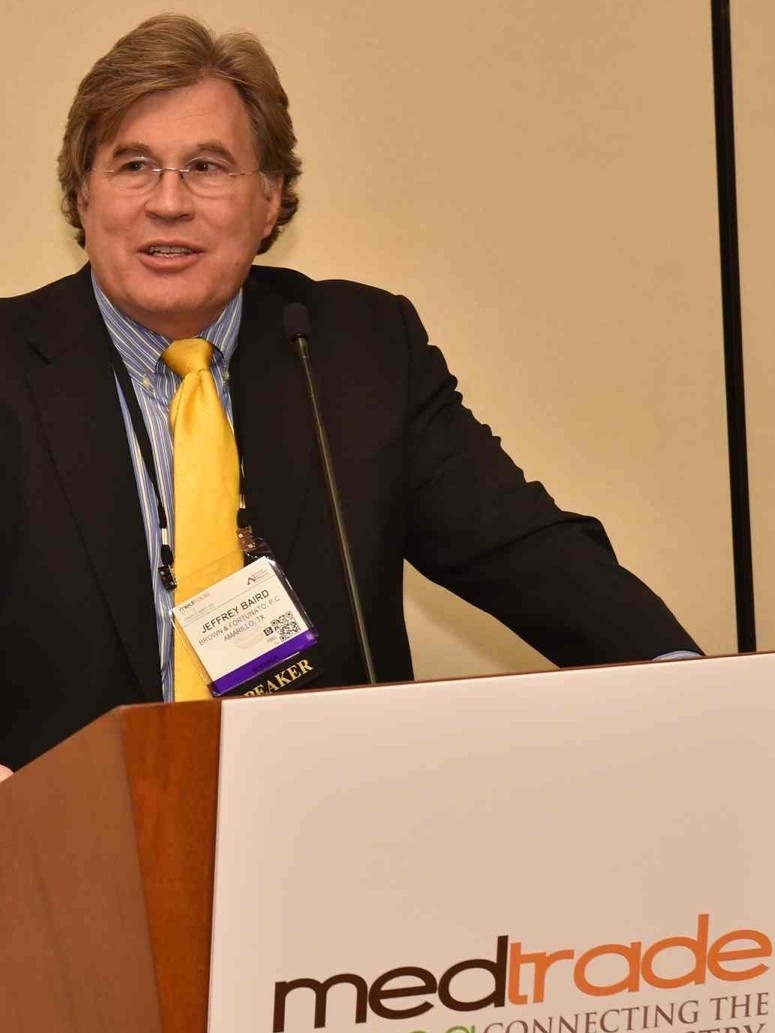 AMARILLO, TX – On June 27, 2016, Medtrade Monday published an article I wrote entitled “Distancing Ourselves From Medicare Fee-For-Service.” The crux of the article was that with the new Medicare fee schedule and the twin challenges of competitive bidding and audits, DME suppliers need to distance themselves from the traditional Medicare fee-for-service (“FFS”) model. In the June 27 article, I discussed a number of ways for suppliers to accomplish this goal. Below, I will discuss several issues that are relevant to the goal of moving away from the Medicare FFS model.
AMARILLO, TX – On June 27, 2016, Medtrade Monday published an article I wrote entitled “Distancing Ourselves From Medicare Fee-For-Service.” The crux of the article was that with the new Medicare fee schedule and the twin challenges of competitive bidding and audits, DME suppliers need to distance themselves from the traditional Medicare fee-for-service (“FFS”) model. In the June 27 article, I discussed a number of ways for suppliers to accomplish this goal. Below, I will discuss several issues that are relevant to the goal of moving away from the Medicare FFS model.
Participating Supplier. A DME supplier elects to become a “participating supplier” by completing the Medicare Participating Physician or Supplier Agreement (Form CMS-460). When a DME supplier elects to become a participating supplier, the supplier agrees to accept assignment and agrees to be paid the Medicare-allowed amount, less any unmet deductible and coinsurance.
Non-participating Supplier. When a DME supplier is a “non-participating supplier,” the supplier may accept assignment on a claim-by-claim basis. If a non-participating supplier accepts assignment on a claim, it agrees to be paid the Medicare-allowed amount as full payment, except for any unmet deductible and coinsurance. If a non-participating supplier does not accept assignment, the supplier can collect directly from the patient and charge more than the Medicare allowable. At the patient’s request, the supplier is required to file the claim with Medicare on behalf of the patient, and any Medicare reimbursement is paid directly to the patient. Note that a competitive bid contract supplier, even if it is a “non-participating supplier,” is in reality a “participating supplier” as it provides products to patients under its competitive bid contract. Outside of competitive bidding, the non-participating supplier can bill non-assigned.
Switching from Participating Supplier to Non-participating Supplier. If a participating supplier elects to become a non-participating supplier, the supplier must terminate its existing Medicare participating supplier agreement. To terminate an existing Medicare participating supplier agreement and become nonparticipating, the supplier must notify the NSC in writing during the Medicare participating supplier agreement enrollment period. The annual participation enrollment period begins on November 15 and concludes on December 31 of each year.
Billing Non-Assigned. If a non-participating supplier provides a product on a “non-assigned basis,” this means the supplier is not agreeing to accept the Medicare allowable as payment in full, can collect directly from the patient, and can charge more than the Medicare allowable. At the patient’s request, the supplier must file the claim with Medicare on behalf of the patient and any Medicare reimbursement will be paid directly to the patient.
Statutorily Excluded From Coverage. If a non-participating/non-competitive bid contract supplier sells or rents an item (that falls within a product category covered by CB) on a non-assigned basis to a patient residing in a CBA, the item is statutorily non-covered and the patient will not be reimbursed by Medicare. Section 1862 of the Social Security Act (the “Act”) excludes from coverage instances “where the expenses are for an item or service furnished in a competitive acquisition area by an entity other than an entity with which the Secretary has entered into a contract . . .” The non-participating/non-contract supplier is responsible for notifying the beneficiary that it is not a contract supplier for the competitive bidding item in the CBA, and the supplier must obtain a signed ABN indicating that the beneficiary was informed in writing, prior to receiving the competitively bid item, that there would be no payment by Medicare.
 Selling Non-Assigned. Assume that a non-participating supplier sells an item, on a non-assigned basis, to a patient (not covered by competitive bidding) for cash. Assume that Medicare reimburses the item as a “sale item,” not as a “capped rental item.” In this instance, the supplier can sell the item to the patient for whatever price the supplier chooses, and if the patient seeks reimbursement from Medicare, Medicare will pay the patient the fee schedule amount (less the patient’s deductible). At the patient’s request, the supplier must file the claim with Medicare on behalf of the patient. Now let’s switch gears and assume that an item is reimbursable by Medicare as a “capped rental item.” The non-participating supplier can nevertheless sell the item, on a non-assigned basis, to a patient (not covered by competitive bidding) for cash. The supplier can sell the item to the patient for whatever price the supplier chooses. However, Medicare will not pay anything to the patient because Medicare will only pay for rental of capped rental items and does not pay for the purchase of such items. Since the supplier should expect Medicare not to make payment in such an instance, it must obtain an ABN signed by the patient informing the patient that Medicare will pay for the rental, but not the purchase, of the item.
Selling Non-Assigned. Assume that a non-participating supplier sells an item, on a non-assigned basis, to a patient (not covered by competitive bidding) for cash. Assume that Medicare reimburses the item as a “sale item,” not as a “capped rental item.” In this instance, the supplier can sell the item to the patient for whatever price the supplier chooses, and if the patient seeks reimbursement from Medicare, Medicare will pay the patient the fee schedule amount (less the patient’s deductible). At the patient’s request, the supplier must file the claim with Medicare on behalf of the patient. Now let’s switch gears and assume that an item is reimbursable by Medicare as a “capped rental item.” The non-participating supplier can nevertheless sell the item, on a non-assigned basis, to a patient (not covered by competitive bidding) for cash. The supplier can sell the item to the patient for whatever price the supplier chooses. However, Medicare will not pay anything to the patient because Medicare will only pay for rental of capped rental items and does not pay for the purchase of such items. Since the supplier should expect Medicare not to make payment in such an instance, it must obtain an ABN signed by the patient informing the patient that Medicare will pay for the rental, but not the purchase, of the item.
Renting a “Capped Rental Item” Non-Assigned. Assume that an item is reimbursable by Medicare as a “capped rental item.” A non-participating supplier can rent the item, on a non-assigned basis, to a patient not covered by competitive bidding. In so doing, the supplier can set the rental amount at whatever amount the supplier chooses, and then if the patient seeks reimbursement from Medicare, Medicare will pay the fee schedule rental payment to the patient on a monthly basis. At the patient’s request, the supplier is required to submit claims to Medicare on behalf of the patient.
Length of Term of ABN. Assume that an item is reimbursable by Medicare as a “capped rental item.” Assume that the non-participating supplier rents the item, on a non-assigned basis, to a patient not covered by competitive bidding. Assume that the supplier concludes that an ABN is appropriate. The question is: “Is it sufficient for the supplier to issue one ABN at the beginning of the rental term, or must the supplier issue an ABN every month of the rental term?” A single ABN is good for one year. A new ABN would be required if the rental extends beyond one year.
Jeff Baird will be presenting the following webinar:
AAHOMECARE’S EDUCATIONAL WEBINAR
Responding to Reimbursement Cuts: Billing Non-Assigned and Other Options
Presented by: Jeffrey S. Baird, Esq., Brown & Fortunato, P.C.
Wednesday, July 27, 2016
2:30-4:00 p.m. EASTERN TIME
We now know what Medicare reimbursement is……and it is not pretty. The bottom line is that Medicare will pay as little as possible for DME. And yet, with 78 million Baby Boomers retiring at the rate of 10,000 per day, the demand for DME will dramatically increase. This webinar will primarily focus on billing on a non-assigned basis. Specific issues to be addressed include: (i) What does it mean to bill non-assigned? (ii) If the supplier bills an item non-assigned, then can the supplier set the price without limitations? (iii) Can a supplier bill a rental item non-assigned? If so, can the supplier demand a purchase price up front or is the supplier obligated to take rental payments from the patient? (iv) If the supplier bills non-assigned, then is it required to submit a claim for reimbursement on behalf of the patient? (v) If a supplier is a non-contract supplier providing competitive bid products on a non-assigned basis in a CBA, must the supplier utilize an ABN? (vi) If a supplier provides products, on a non-assigned basis, to patients residing outside a CBA, must the supplier utilize an ABN? (vii) If a supplier provides a rental item on a non-assigned basis, and receives monthly rental payments from the patient, is one ABN at the beginning sufficient or must the supplier utilize an ABN every month? In addition to non-assigned billing issues, the webinar will discuss other options for the supplier to lessen its dependence on Medicare fee-for-service.
Register for Responding to Reimbursement Cuts: Billing Non-Assigned and Other Options on Wednesday, July 27, 2016, 2:30-4:00 pm ET, with Jeffrey S. Baird, Esq., of Brown & Fortunato, PC.
Please contact Ika Sukh at [email protected] if you experience any difficulties registering.
This webinar is free to AAHomecare members, and $49.00 for non-members.
Jeffrey S. Baird, JD, is Chairman of the Health Care Group at Brown & Fortunato, PC, a law firm based in Amarillo, Tex. He represents pharmacies, infusion companies, HME companies and other health care providers throughout the United States. Mr. Baird is Board Certified in Health Law by the Texas Board of Legal Specialization, and can be reached at (806) 345-6320 or [email protected].

